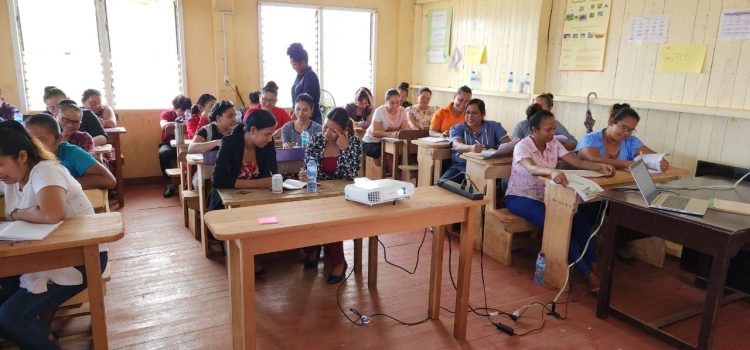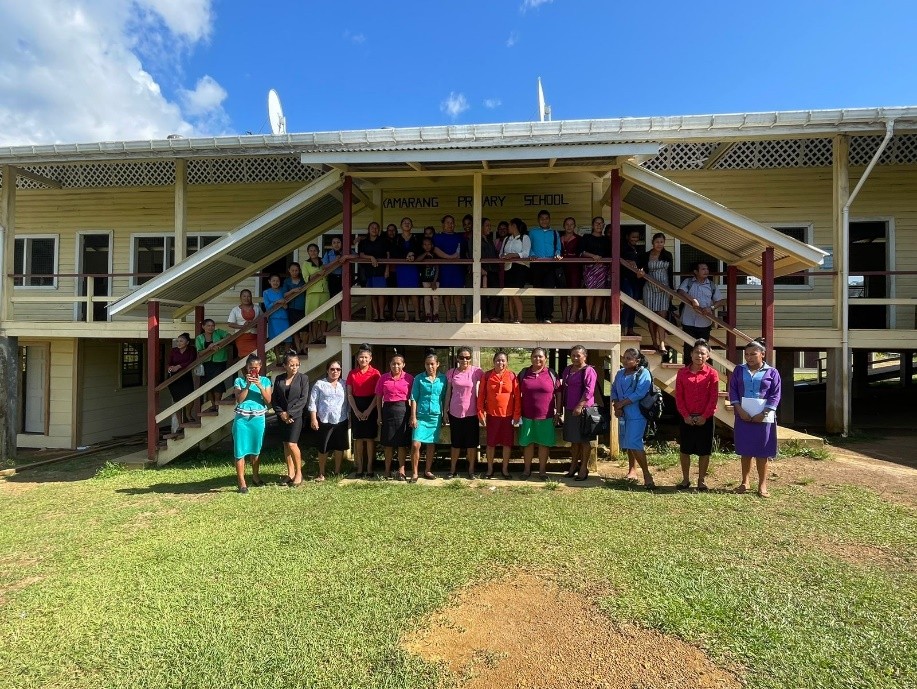As part of its efforts to improve the quality of education and provide equal opportunities to students in rural areas, the Ministry of Education (MoE) has announced that schools in the hinterland will officially be using the renewed curriculum tailored for primary schools as of September 2023.
This follows the successful implementation of the renewed curriculum in coastal schools last September, and marks a significant step towards creating a more inclusive and equitable education system nationwide.
According to the National Centre for Educational Resource Development (NCERD) Head of Curriculum Omwattie Ramdin, the new curriculum aims to allow students to learn in a safe, supportive, and equitable environment that promotes confidence, curiosity, and engagement where learning is done both intellectually and enjoyably.
“… The renewed curriculum [will be used] in September for Grades 1 to 4 in the four core areas… from Haimcabra, Kachikamo, Karrau, Waramadong, Kopinanag, Maikwak, Apoteri, [and] Konashen,” she stated.
In preparation for the curriculum’s implementation, 700 teachers from hinterland schools have already begun receiving specialised training provided by the MoE. These training sessions focus on familiarising educators with the updated syllabus, teaching methodologies, and the benefits the new curriculum brings to students, she said.

The training has also been designed to equip teachers with the necessary tools and knowledge to effectively deliver the curriculum’s diverse subjects, including the integration of Indigenous knowledge, vocational training, and environmental awareness. By providing this targeted support, the ministry aims to ensure that teachers in hinterland schools are well-prepared to deliver a high-quality education that resonates with the unique needs and cultural heritage of their students, Ramdin said.
Educators who have participated in the training sessions have expressed their enthusiasm for the renewed curriculum, recognising its potential to positively impact the lives of their students.
A teacher from a remote hinterland school told this publication: “The ministry’s training has opened our eyes to new possibilities in education. We are excited to impart knowledge that is not only academically enriching but also culturally relevant to our students’ lives. This renewed approach will strengthen the bond between our children and their roots.”
The benefits of the renewed curriculum are expected to extend beyond the classroom, aiming to uplift entire communities in the hinterland regions. Moreover, with the integration of vocational training, the curriculum aims to equip students with practical skills that can enhance their employability within their own communities, reducing the need to migrate to urban centres for work opportunities. Further-more, the preservation of Indigenous languages and the emphasis on environmental awareness instill a sense of pride and responsibility among students, fostering a new generation of culturally conscious citizens who are invested in the sustainable development of their communities, this newspaper was told.
Ramdin, in a statement, encouraged the teachers to have an open mind as they embark on interacting with the renewed curriculum. “Ask questions for edification, know your students’ learning preferences, and tailor the activities to suit them. Be more intentional with the learners and plan activities that the children will see as fun while at the same time deepening their understanding of the concept,” she said.
One of the most notable features of the renewed curriculum is the shift towards a practical hands-on approach in the classroom, moving away from traditional ‘chalk and talk’ methods of teaching. Recognising the need for more engaging and interactive learning experiences, MoE is encouraging teachers to adopt innovative teaching methodologies that involve students actively in the learning process, Ramdin said.
Further, students will have the opportunity to participate in various practical activities and experiments, enabling them to develop critical thinking, problem-solving, and teamwork skills. These activities will be designed to align with the subjects taught, ensuring that students have a deeper understanding of the theoretical concepts they learn. By providing a more dynamic and experiential learning environment, MoE aims to make education more enjoyable and relatable for students, Ramdin added.
The shift towards a practical approach also aligns with the curriculum’s emphasis on vocational training. By offering students the opportunity to engage in hands-on activities related to various trades and skills, the renewed curriculum aims to prepare them for practical challenges they may encounter in their lives beyond school, she also said
The benefits of this new approach extend beyond academic achievements. It is expected to boost students’ self-confidence, nurture creativity, and foster a positive attitude toward learning. Moreover, the hands-on approach is well-suited for diverse learning styles, allowing each student to thrive and reach their full potential, she added.
Minister of Education, Priya Manickchand, emphasised the significance of this transition in teaching methods. “Education should be an inspiring journey that prepares students for real-life challenges. The practical hands-on approach in the renewed curriculum will kindle a passion for learning and empower our students with valuable skills for the future,” she said.
According to the statement, as hinterland schools embrace this practical hands-on approach alongside other key components of the revamped curriculum, there is a renewed sense of hope that education in rural areas will witness a transformative change. With teachers ready to implement innovative methodologies and students eager to explore new learning experiences, the nation looks forward to a brighter and more equitable future for its next generation of leaders.






